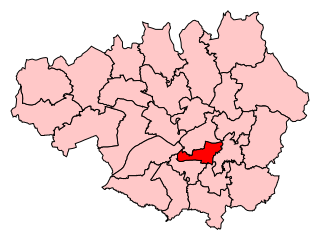
Bury St Edmunds was a constituency in Suffolk from 1621 to 2024, most recently represented in the House of Commons of the UK Parliament from 2015 to 2024 by Jo Churchill, a Conservative.

Blackburn is a constituency in Lancashire, England, which is represented in the House of Commons of the UK Parliament by independent politician Adnan Hussain. From 2015 to 2024 it was represented by Kate Hollern of the Labour Party and, from 1979 to 2015, by Jack Straw who served under the Labour leaders of Neil Kinnock and John Smith and the Labour governments of Tony Blair and Gordon Brown.

Manchester, Blackley was a borough constituency represented in the House of Commons of the Parliament of the United Kingdom which existed from 1918 to 2010. It elected one Member of Parliament (MP) by the first past the post system of election. In boundary changes for the 2010 general election it was replaced by Blackley and Broughton.

Manchester Gorton was a constituency represented in the House of Commons of the UK Parliament. It was the safest Labour seat in Greater Manchester by numerical majority and one of the safest in the country.

Bootle is a constituency which has been represented in the House of Commons of the UK Parliament, since 2015 by Peter Dowd of the Labour Party.
Epping was a parliamentary constituency represented in the House of Commons of the UK Parliament from 1885 to 1974. It elected one Member of Parliament (MP) by the first past the post system of election.
Manchester East was one of six single-member parliamentary constituencies created in 1885 by the division of the existing three-member Parliamentary Borough of Manchester. The others were: Manchester South, Manchester North, Manchester North East, Manchester North West and Manchester South West. They were all abolished in 1918.
Manchester North was one of six single-member Parliamentary constituencies created in 1885 by the division of the existing three-member Parliamentary Borough of Manchester. It was abolished in 1918.
Manchester South was one of six parliamentary constituencies created in 1885 by the division of the Parliamentary Borough of Manchester, England. It returned one Member of Parliament (MP) to the House of Commons of the Parliament of the United Kingdom, elected by the first-past-the-post voting system. The constituency was abolished in 1918.
Wednesbury was a borough constituency in England's Black Country which returned one Member of Parliament (MP) to the House of Commons of the Parliament of the United Kingdom from 1868 until it was abolished for the February 1974 general election.

Darwen was a county constituency in Lancashire, centred on the town of Darwen. It returned one Member of Parliament to the House of Commons of the Parliament of the United Kingdom from 1885 until it was abolished for the 1983 general election.

Hornsey was a constituency that returned one Member of Parliament (MP) to the House of Commons of the UK Parliament, 1885 — 1983. It was then largely replaced by Hornsey & Wood Green. Its voters using the first-past-the-post system elected the Conservative Party candidate at each election. Its closest result was a 1.29% majority at the 1966 election which saw the start of the Second Wilson Ministry. From 1945 onwards the runners-up in the seat were the Labour Party candidates.
Stretford was a parliamentary constituency in North West England, which returned one Member of Parliament (MP) to the House of Commons of the Parliament of the United Kingdom.
Bury was a borough constituency centred on the town of Bury in Lancashire. It returned one Member of Parliament (MP) to the House of Commons of the Parliament of the United Kingdom.

Mile End was a parliamentary constituency centred on the Mile End district of the East End of London. It returned one Member of Parliament (MP) to the House of Commons of the Parliament of the United Kingdom.
Oldham was a parliamentary constituency centred on the town of Oldham, England. It returned two Members of Parliament (MPs) to the House of Commons of the Parliament of the United Kingdom. The constituency was created by the Great Reform Act of 1832 and was abolished for the 1950 general election when it was split into the Oldham East and Oldham West constituencies.
The 1920 Louth by-election was a parliamentary by-election for the British House of Commons constituency of Louth in Lincolnshire. Voting was held on 3 June 1920. The by-election took place five days after the Louth Flood of 29 May 1920 had claimed 23 lives.
The Manchester South by-election was a Parliamentary by-election held on 5 March 1912. The constituency returned one Member of Parliament (MP) to the House of Commons of the United Kingdom, elected by the first past the post voting system.
The 1912 Manchester North West by-election was a Parliamentary by-election held on 8 August 1912. It returned one Member of Parliament (MP) to the House of Commons of the United Kingdom, elected by the first past the post voting system.

Richard Leopold Reiss, was a British Liberal Party politician who later joined the Labour Party. He was Director of the Hampstead Garden Suburb Trust Ltd. He was awarded the Order of St Olav of Norway. In 1948 he was awarded the Howard Memorial Medal for outstanding services to town planning.












